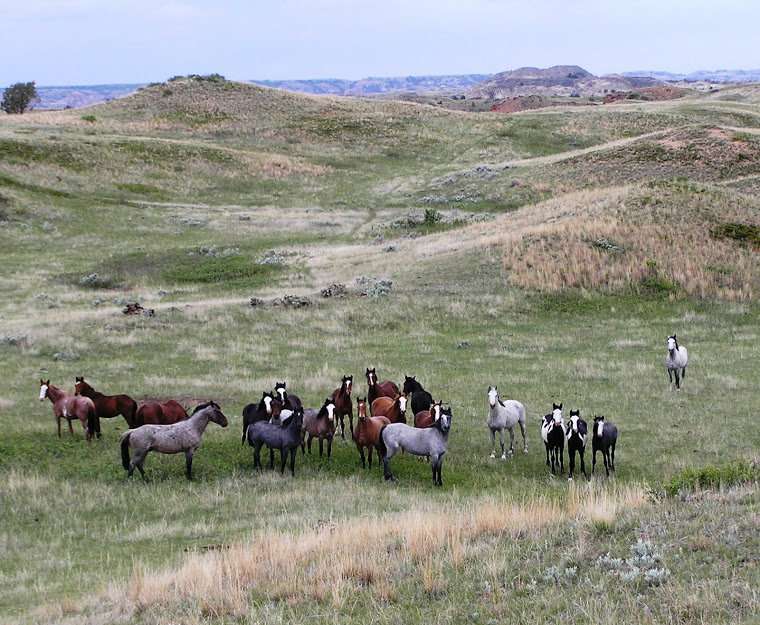Novel study shows promise for managing wild horse populations

For more than eight years, Colorado State University researchers have studied a vaccine called GonaCon as a safe and humane solution for the overpopulation of wild horses.
"This is not just an issue in the western United States, it's a worldwide problem," said Dan Baker, co-principal investigator on the project and an affiliate faculty member in the Department of Biomedical Sciences. "And what we've learned is very encouraging and could provide a useful management tool for suppressing population growth rates in free-ranging horses and possibly other wild ungulate species."
In fall 2013, the team administered booster immunocontraceptive vaccines of GonaCon to a group of mares in Theodore Roosevelt National Park, marking the first time revaccination with GonaCon had ever been studied in free-roaming horses.
Their work shows that GonaCon, which temporarily interrupts ovulation and can be delivered using a remote syringe dart delivery technique, is a safe and effective vaccine without significant side effects. While the initial vaccine was only about 50 percent effective in suppressing fertility, administering the booster vaccine resulted in 85 to 100 percent sustained infertility for four years in treated mares.
Here the researchers share their insights on the significance of the recently published findings:
How is this method different from what land managers currently use?
Terry Nett, co-principal investigator on the project and a professor in the Department of Biomedical Sciences:
"The two primary methods used to manage free-ranging wild horses are surgical castration and immunization with procine zona pellucida (PZP) vaccine. Surgical castration requires catching animals individually, anesthetizing them, and having a veterinarian perform surgery, often under less-than-ideal conditions. This is an expensive, labor-intensive approach to reducing fertility and can be dangerous, particularly for mares.
"The PZP vaccine, which targets the covering of the egg and prevents sperm from fertilizing it, is quite effective with around a 90 percent reduction rate in fertility and it can be delivered by dart, but it needs to be administered each year to maintain effectiveness. And since PZP does not suppress sexual behavior, immunized mares continue to display sexual receptivity for an entire breeding season which has a major impact on herd dynamics.
"Our approach, GonaCon, is a vaccine that targets the brain hormone gonadotropin-releasing hormone (GnRH), which is responsible for stimulating reproduction in both females and males. It can be administered by dart and prevents ovulation and displays of sexual receptivity from occurring so that infertility is achieved and normal herd dynamics are maintained. We found that an initial vaccination against GnRH with GonaCon leads to suppression of fertility in only about half of the mares, but near complete infertility is achieved for up to four years following the administration of a booster immunization. This vaccine has the potential to lead to sterility in stallions as well."
What could this mean for the future of wild horse population management?
Jason Bruemmer, collaborator on the project and a professor in the Department of Animal Sciences:
"This project clearly demonstrates that GonaCon is an effective tool for managing wild horse populations. Because it is a product designed and produced to target an action by a very specific hormone (GnRH), there are no side effects.
"We have demonstrated that the booster vaccine leads to almost complete infertility for approximately four years. This allows those managing horse numbers on public lands to decide if or when to reimmunize in order to efficiently control the population by maintaining the herds and slowing or stopping growth. As Terry Nett mentioned, an important feature of this project is that the behavior of the herd as a result of the GonaCon vaccine remains unchanged and the healthy dynamics remain intact, unlike PZP-treated herds."
What's the next step and ultimate goal?
Dan Baker, co-principal investigator and affiliate faculty member in the Department of Biomedical Sciences:
"This is an ongoing effort and additional research is needed to complete the study's objectives. We now need to define the duration of effectiveness and determine if long-term or permanent infertility is a possible outcome. We also need to investigate the optimum revaccination schedule to maintain infertility and the safety of repeat vaccinations."
"Ultimately, there is an urgent need to extend the results of our research with the individual horses at Theodore Roosevelt National Park to test of GonaCon's effectiveness in suppressing growth rates of other free-ranging populations."
More information: Dan L. Baker et al. Reimmunization increases contraceptive effectiveness of gonadotropin-releasing hormone vaccine (GonaCon-Equine) in free-ranging horses (Equus caballus): Limitations and side effects, PLOS ONE (2018). DOI: 10.1371/journal.pone.0201570
Journal information: PLoS ONE
Provided by Colorado State University


















